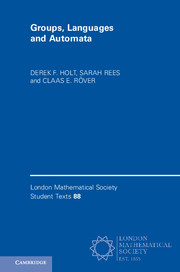Book contents
- Frontmatter
- Contents
- Preface
- PART ONE INTRODUCTION
- PART TWO FINITE STATE AUTOMATA AND GROUPS
- PART THREE THE WORD PROBLEM
- 10 Solubility of the word problem
- 11 Context-free and one-counter word problems
- 12 Context-sensitive word problems
- 13 Word problems in other language classes
- 14 The co-word problem and the conjugacy problem
- References
- Index of Notation
- Index of Names
- Index of Topics and Terminology
12 - Context-sensitive word problems
from PART THREE - THE WORD PROBLEM
Published online by Cambridge University Press: 16 March 2017
- Frontmatter
- Contents
- Preface
- PART ONE INTRODUCTION
- PART TWO FINITE STATE AUTOMATA AND GROUPS
- PART THREE THE WORD PROBLEM
- 10 Solubility of the word problem
- 11 Context-free and one-counter word problems
- 12 Context-sensitive word problems
- 13 Word problems in other language classes
- 14 The co-word problem and the conjugacy problem
- References
- Index of Notation
- Index of Names
- Index of Topics and Terminology
Summary
The classes CS and DCS of context-sensitive and deterministic contextsensitive languages were defined in 2.2.18 as the languages accepted by (deterministic) linearly bounded Turing machines. We saw in Theorem 2.8.2 that CS is also the class of languages generated by a context-sensitive grammar.
It follows from the closure properties of CS and DCS (2.8.3) and the results in Section 3.4 that the classes of finitely generated groups G with (deterministic) context-sensitive word problem are closed under finite extension and finitely generated subgroups. These classes have been systematically studied by Lakin [174] (see also [175, 176]), who proved in particular that they are closed under free and direct products; we leave these proofs as exercises for the reader.
Lakin observed that all finitely generated linear groups are deterministic context-sensitive. In fact a stronger result is true: their word problems are soluble in logspace. The class of linear groups includes the classes of finitely generated free groups, virtually polycyclic groups and their holomorphs, and torsion-free metabelian groups.
Shapiro had previously proved [235] that automatic groups are deterministic context-sensitive, and we included this result as Corollary 5.2.12. Hence all finitely generated subgroups of automatic groups are deterministic contextsensitive. An example of Lakin that is not of this form is described briefly in the next section.
It is unknown whether there exist groups that are context-sensitive but not deterministic context-sensitive. Indeed it is unknown whether there exists a language of any kind in CS\DCS, although there is no reason at all to believe that these language classes should be equal.
It is not easy to produce examples of finitely presented groupsG with soluble word problem for which it can be proved that. It can be shown that, if WP(G) is soluble in linearly bounded space, then it is soluble in time for any constant, and so one way of producing examples of the type we are looking for is to use the method of Avenhaus and Madlener mentioned in Section 10.2 to construct groups in which the time complexity of WP(G) is a primitive recursive function not bounded by any exponential function.
- Type
- Chapter
- Information
- Groups, Languages and Automata , pp. 236 - 248Publisher: Cambridge University PressPrint publication year: 2017



